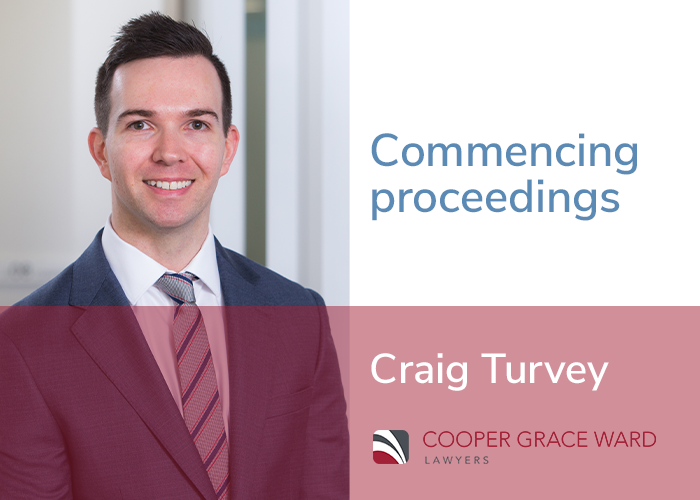In this week’s video, senior associate Craig Turvey talks about commencing proceedings under the new Federal Circuit and Family Court Rules.
VIDEO TRANSCRIPT
Hi, my name is Craig Turvey I’m a senior associate in the Family Law Workgroup at Cooper Grace Ward.
Today I’d like to talk to you about commencing proceedings under the new Federal Circuit and Family Court rules. This is one of the most significant changes to previous practice, particularly for financial matters.
Commencing proceedings under the old Federal Circuit and Family Court rules
Previously, if you had a property settlement or spousal maintenance application or something financially related like that you didn’t have to go through these particular steps in order to commence proceedings. So, for example, you could separate and if for some reason you decided you wanted to rush off to court and file your property settlement application, you could do it. There was no time limit for you in the sense that you didn’t have to wait a certain period of time before filing an application, although there were pre-action procedures under the old rules, generally, people didn’t follow them, and the judicial officers didn’t really stop people. So, you could file your application and you could have it heard on a first return date and there was no real criticism of people for not going through the steps they should have gone through before commencing proceedings. That’s all changed now under the new set of rules.
The changes in financial matters
So, parties are now required to in financial matters, exchange lists of assets and liabilities, disclose all relevant financial information so that’s to provide full and frank disclosure of your financial circumstances, then you’re supposed to go to family dispute resolution, which is typically mediation. And only at that point, either if mediation hasn’t worked or you can’t go to mediation, for example, because there might be serious domestic violence issues, or there might be significant disclosure issues. So, the other party might not have provided you with any disclosure documents and so you don’t know what their financial position is so you’re not really in a position to negotiate. Only if you reach that sort of category, you’ve gone through those steps. Then again, before you commence proceedings, there’s one further step that you have to go through that you didn’t have to previously.
And now people are required to write to the other side and provide them with what’s called a notice of intention to commence proceedings. So, it’s basically a formal letter which says ‘I’ve gone through these steps to try and resolve the matter. They haven’t worked. These are what I say the issues in dispute are. If I have to commence my application, this is a list of all the orders that I’ll be seeking in the application.’ You then have to make a settlement offer, which in my experience at the moment, people just generally whatever their final orders are or what they’re proposing is their settlement offer.
That might change over time but at the moment, that’s just what people are doing. And then you have to provide at least, the other party at least 14 days notice to respond to that letter and those issues before you can then commence proceedings. So, only if they don’t respond within at least 14 days or if they respond and then you’re supposed to give them a reasonable amount of time to try and negotiate any further issues. So, for example, they might respond and you might be a little, you might be close, but just a little bit far apart in terms of some issues. You wouldn’t, then as matter of good practice anyway rush off to court and nor should you, I think in compliance with the new rules. If you’re pretty close, there’s then an expectation that you’ll try and negotiate sensibly to resolve whatever that little dispute is. If either you still can’t do that after a reasonable amount of time or you’re just miles apart in terms of where the positions are, so no one’s close to settling it. Only at that point can you commence proceedings and you have to file what’s called a genuine step certificate to basically say, ‘I’ve ticked all the boxes, I’ve gone through all the steps that I need to try and resolve the matter before going to court’. That’s in a financial sense.
The changes in parenting matters
In a parenting sense, it’s not really any different because that’s really, to a large degree, what people had to do under the old rules anyway. You had to obtain what’s called a Section 60I certificate, which means you’ve attempted family dispute resolution before you could then go to court. So, I suppose the only difference now is in a parenting sense, you have to get the Section 60I certificate again and you just need to be careful that when you’re contacting a family dispute resolution practitioner that it is someone who can issue a section 60I certificate. There’s a category of people who are qualified to issue the certificates. Just be careful if you want the certificate or you need it to go through those next steps that you’ve attended family dispute resolution with someone who can actually give it to you. So, once you’ve done that, if that hasn’t worked, you then have to go through those same steps that I just spoke about from a property perspective. So, you have to give notice of what you say the disputed issues are. You have to outline what the orders are that you’re seeking in your parenting application if you go to court. You have to make a settlement offer, you give them at least 14 days. So, it’s the same steps.
Commencing proceedings under the new Federal Circuit and Family Court Rules
So, consistent with people’s obligations under the new rules, it’s really just a matter of good practice. People should always have been going through those steps anyway before commencing proceedings. But the new set of rules really does consolidate in an easy to read and understand way what everyone’s obligations are and what the sensible steps are that you really should take before you commence either parenting proceedings or financial proceedings.
Now there are costs orders that can be made against people if they either don’t jump through the right steps or they fill in incorrectly the genuine steps certificate. So, for example, if they say that they’ve taken certain steps and they haven’t done those things, then I’m aware of registrars making cost orders against people at the first return date. So, it’s more important than ever that you understand what your obligations are, that you go through all of the procedures and sensible processes that you should go through before you rush off to court, which should always be a last resort for people.
So, if you have any questions about what your obligations are or if you have any queries about commencing court proceedings, please don’t hesitate to contact me or one of the other family lawyers at Cooper Grace Ward.





